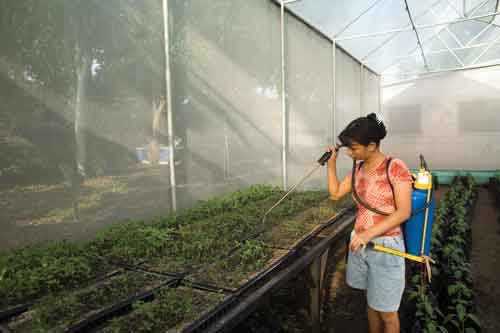Banking The Unbanked
La Fida finds ways to spread and trickle down wealth to rural El Salvador
El Salvador is enjoying more economic growth than any other Central American state, according to World Bank indicators. Nevertheless, rapid growth typically increases the disparity in income distribution, particularly in a country still dressing its wounds from the 13-year civil conflict that ended in 1992. But a salve for this disparity is on the way.
The International Fund for Agricultural Development (IFUD), called la Fida in El Salvador, is an arm of the United Nations. It has just assigned $15 million (USD) for projects in El Salvador, expressly to improve conditions in rural El Salvador, where most of the nation’s poor reside.
La Fida is looking for ways to make the annual infusion of hundreds of millions of dollars from Salvadorans abroad go further. One fourth of the nation’s population now receives such remesas, such that El Salvador’s most valuable export, in monetary terms, is labor.
One strategy will be to encourage Salvadoran banks to encourage remesa recipients to set aside a portion of their money for savings. Indeed, many remittance recipients do not have bank accounts of any kind. Also, banks are often reluctant to promote the opening of accounts, since the poor maintain only small balances, and since opening branches in impoverished areas is seen as a poor investment. But la Fida wants to “bank” the “unbanked.”
La Fida also seeks to reduce transfer costs and thereby enhance the development impact of remesas. Accordingly, the agency is co-financing a $7.6 million program in Latin America with the Inter-American Development Bank to help credit unions and microfinance lenders to improve services in poor rural areas. It also works with expatriates to help provide access to investment resources and to encourage the formation of “ethnic markets” (in the United States and other countries where Salvadorans have settled) for típica food and crafts.
El Salvador already has one advantage over most countries in the reduction of transfer costs, because nothing is lost in currency exchange. In 2000, El Salvador “dollarized;” though the colón still circulates, the dollar is the de facto national currency. This step was possible because, thanks to remesas, El Salvador was and is flooded with dollars.
Among those helped through la Fida will be Merlin Peña, who left El Salvador in 1987 and now works in Boston as a social worker. Along with other Salvadorans there, she formed a hometown association (HTA) that not only sends monthly remittances, but has raised enough money to erect a nursery, a special education school, and a home for the elderly—all back home.
For such projects to be successful, an HTA needs to exist at both ends—one in the expat community and one in the old country. La Fida is accordingly sponsoring workshops at both ends. Because of this, an HTA in Los Angeles (the world’s second largest “Salvadoran” city) has been able to fund the extension of a rural school in the town La Labor, where 685 students are completing their education.
Merlin Peña foresees other benefits. “Our hope,” she says, “is that part of this money will help reverse economic migration. We’ve watched as too many professionals and farmers leave the country.”
Most of the immediate beneficiaries of la Fida empowerment are women. Ana Melida Leonor, a chicken rancher in eastern El Salvador, was among those getting help and training. She is today a community leader and a participant in international forums—something unimaginable only a few decades ago. A much younger beneficiary, Reidi Rosibel Ventura, has, at only 18, her own greenhouse where she grows and supplies seedlings to farmers.
Ultimately, IFUD directors believe that if remesa recipients prosper and save sufficiently, they may amass a surplus that they can loan to, or share outright with neighbors who do not receive remesas. This could lead to the capitalization of more small businesses—and the campesino realization of trickle-down economics.
